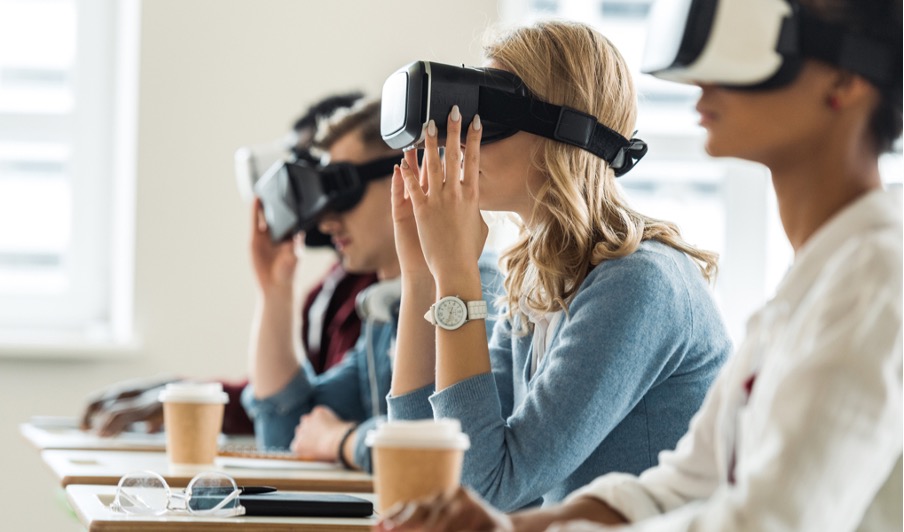
Business education has undergone significant changes, with online MBA programs becoming a viable option for busy professionals. Virtual reality (VR) is one of the most innovative ways technology has revolutionised the online MBA curricula. This innovative approach enhances the learning experience and equips students with the skills needed to thrive in future workplaces.
The Emergence of Virtual Reality in Business Education
It’s no longer just gaming or entertainment; VR has found its place within academia, more specifically, within teaching institutions such as universities, among others, for years. Virtual reality offers an opportunity for online MBA programs because it can fill the gap between distance learning and hands-on experience.
Why Integrating VR in Online MBAs is Important
Immersive Learning Environments
By using VR technology, students can access not just ordinary classrooms but also virtual ones to simulate boardroom meetings or corporate scenarios. This type of immersion can help in retention and engage students in a manner that has long been absent, with many students used to traditional online courses.
Practical Skill Development
VR simulation enables students to practice various business activities, such as negotiation skills and public speaking, without needing a real setup. It provides a safe space for failure, enabling learners not to repeat the same mistake while interacting with such an experience due to the absence of real-world consequences.
Global Collaboration
With VR, there is no geographical limitation to collaborative work between students located in different parts of the world since they can meet and work on projects on the same virtual platform. This fosters cross-cultural understanding and prepares students for the global nature of modern business.
Enhanced Data Visualization in Online MBAs
VR can bring 3D visualizations of complex business data and analytics to life. These visual representations include financial models or market trends that would be hard to grasp without the third dimension, making it easier for students to understand information better and gain insights from different angles.
Preparation for Future Workplaces
MBA Graduates with experience in VR would have an added advantage in the workplace as organizations continue embracing emerging technologies like VR.
Adapting to Remote Work
The COVID-19 outbreak has largely hastened the move towards remote working. This has prompted a need for programs to help MBA students get used to virtual collaboration tools and remote working environments, skills that are now most sought after in the labour market.
Developing Technologically Agile Leaders
During their time at MBA programs, they exposed them to VR technology, making them more likely to use new technologies at work later in life.
Enhancing Decision-Making Skills Through VR Simulations
Hence, through VR simulations, students may encounter high-stakes decision scenarios that closely mirror real life. Such practice is of enormous value if we consider the need for a person to think critically when making decisions or solving problems that arise in any business setup today.
Challenges and Considerations
While the potential of VR in online MBA programs is vast, several factors should be considered:
Technology Access and Cost
Not all students may have access to VR hardware, and the cost of implementing VR systems can be significant for educational institutions.
Creating VR Content
Creating such content for MBA curricula always takes a lot of time and resources.
Balancing Tech with Trad Learning Models
It is important to balance technology-enhanced learning using virtual reality and traditional MBA coursework for a well-rounded education.
The Future Trend of Virtual Reality in Online MBAs
As technology advances and virtual reality becomes more pervasive, its role in internet-based MBA programs will likely rise significantly. This includes:
More Realistic Simulations
Future VR apps might have AI-powered scenarios that adjust depending on individual students’ performances, offering a personalized learning experience.
Combining VR with Other Technologies
There could be a potential example of how such a situation might look when artificial intelligence, augmented reality and data analytics combine to create much wider-ranging learning tools using VR.
Industry-Specific VR Modules
These specialized modules target different sectors or job functions, thereby enabling mastery of specific skills during the graduate period.
Conclusion
In conclusion, it must be acknowledged that virtual reality has been a game changer for MBA programs that take place entirely online because they offer ideal preparation procedures to employees and you can navigate career growth with an MBA program. As VR-enhanced MBA programs embrace immersive experiences that are practical and critical, encompassing adaptability and global collaboration, they undoubtedly set new standards in business study. Over time, as technology changes, more sophisticated ways of using this kind of simulation will be developed, helping learners move from theory into practice and bridging the current gap between virtual reality and real-world applications in online business courses.
